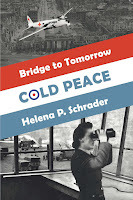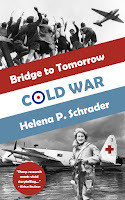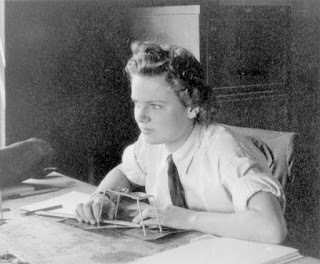The characters of "Cold Peace" - Galyna Borisenko
The threat of tyranny hangs over Bridge to Tomorrow. As historian Timothy Snyder documents all-too-well, no people -- not even Europe's Jews -- were subject to as much oppression and tyranny as the Ukrainians. Before the backdrop of Russia's renewed attack on Ukraine, I decided to include two Ukrainian women in this trilogy: one a refugee from tyranny who has found a home in Britain and the WAAF; the other a former partisan and "Heroine of the Soviet Union." Despite their differences, they recognize a kinship across ideological borders. Their friendship is a key element in the Bridge to Tomorrow trilogy as a whole, but Galyna plays the more important role in Cold War.
When the Bridge to Tomorrow Series opens, Galyna is a WAAF corporal who started the war as a stores clerk, rose to radio mechanic and is now a Russian translator. In her dreams, however, she is a heroine of the SOE. Unfortunately, she when she looks in a mirror, she sees a short and plump young woman not sufficiently glamorous to be taken seriously as the next "Mata Hara." Still, she achieves an "intelligence coup," when she brings information about the impending blockade to her RAF superiors before the Soviets take action. Although MI6 remains skeptical about her value to them, Galyna gets a lucky -- and very dangerous -- break in Cold War.
An excerpt featuring Galyna:
Galyna did not wear uniform and she travelledby public transport from Spandau to Lehrter Station before walking theremaining distance to the rendezvous venue. She was as nervous as the firsttime she’d met Mila and they had found this sordid and rundown bar. The disreputableclientele had intimidated Galyna, but last time, Mila had been armed and unabashedlydiscouraged unwanted approaches by showing her pistol. Galyna didn’t have a sidearmand wouldn’t have been able to use it even if she had. As she descended thethree steps into the seedy bar, her heart was already racing. She didn’t have agood plan for what to do if Mila wasn’t there, which seemed probable since theyhad not set a time.
The air that hit her as she entered was heavy,hot and smoke-filled. Although crowded, Galyna could not spot another woman inthe entire joint, while the men who looked back at her showed predatory interest.Galyna searched for an RAF uniform she could cling to, but she couldn’t spotany British or American military personnel. All the customers appeared to beGermans or member of the forgotten legion of displaced persons. From a nearbytable, the men jocularly signalled for her to join them. “Komm, Fraulein!Komm! Zahlen gut!”
Galyna’s German was not good, but good enoughto understand what that meant! She spun about and started up the stairs again.She couldn’t do this.
Someone grabbed her from behind and shestarted to scream. Instead, a hand came down over her mouth and Mila hissed inher ear. “It’s me and I’m armed.”
Galyna hadn’t recognised Mila because she woremen’s clothes and a peaked cap low over her brow that covered her hair. Face toface with her and feeling her strong embrace, Galyna felt a rush of relief. Sheflung her arms around her friend in gratitude.
“Come, come,” Mila urged, taking her by thehand and leading her to a little table almost behind the stairs. A candle stuckin the mouth of a bottle was half burned down and a beer glass contained afinger of liquid left. Mila had been waiting for a while.
Mila signalled imperatively to the waiter, andhe hastened over as if he were afraid of her. The other men had turned away,too. Mila was prominently armed again.
“What do you want to drink?” Mila asked Galynain Ukrainian.
“Tea,” Galyna answered.
“You’re sure?” Galyna nodded, and Mila placedthe order in German. The waiter bobbed his head and retreated.
The Ukrainians sat down opposite one another,and Mila reached out to take Galyna’s hands in both of hers. She lookedintently into Galyna’s face as she asked, “Are you all right?”
“This place frightens me, that’s all.Otherwise, I’m fine.” Galyna felt ashamed that she had almost run away. Whatsort of secret agent would she make if she were afraid of going to a bar alone?
“Look! I’ve brought you everything I could!”Mila responded, pulling her bulging knapsack onto her lap and unloading it.“Sausage, smoked ham, canned sardines, cheese, condensed milk.” As she spoke,she unpacked the items and spread them out on the table.
Galyna gaped at them, confused.
“And here,” she ended proudly, “because mandoes not live by bread alone, some caviar I snitched from Marshal Sokolovsky’slast banquet.” As she spoke she placed alarge glass of caviar on the table. It was the only jar with a label inCyrillic lettering. All the other goods were American products sent to theSoviet Union during the war.
“Mila! What? Why?” Galyna’s eyes swept backand forth.
“You must be starving, Galyna. I know that. Iknow you would never tell me, but we have all heard that you are getting almostnothing to eat any more.”
“Mila!” Galyna gasped out, reaching across thetable for her friend’s hand. “You are so sweet! So kind! I don’t know what tosay.”
“Don’t say anything. Just pack it up. You havea knapsack?”
“Yes, yes, but you don’t understand. We aren’tstarving. Look at me!” She gestured toward her solid figure. “I’m as fat asever.”
Mila paused to look at Galyna, cocking herhead to one side puzzled.
“Seriously,” Galyna stressed. “The food isgetting boring and almost all of it is dried now — dried potatoes, dried milk,dried eggs — but there is enough. At least so far. Or anyway for theoccupation forces. That’s not why I called you.”
“No?” It was Mila’s turn to look bewildered.
“No. Something else has happened. Somethingthat has — has —.” She stopped herself and took a fresh approach. “You knowwhat happened to my father.”
Mila nodded solemnly.
“Now another friend, not a close friend, anacquaintance really, but he’s a British officer, Mila, and he disappeared duringa sightseeing trip in the Soviet Sector. The official answer is that they don’tknow where he is but… I don’t believe them.”
Mila shook her head. “Of course, you don’tbelieve them. You shouldn’t. They tell lies all the time.”
“If we could find out where he is, who is holdinghim, then we could protest through the proper channels, but as it is….” Sheended with a helpless shrug, her gaze fixed on the far side of the room. Turningback to Mila, she added in a softer, tenser voice, “That frightens me, Mila.” AlthoughGalyna had planned this appeal, she discovered that she did not have to pretendfear; she was sincerely frightened.
Mila put a reassuring hand over hers. “Iunderstand. This is very dangerous for you.” She looked around the bar, saw thewaiter bringing Galyna’s tea and sat back in her chair. Galyna followed herlead and they both waited while the waiter placed a tea and a beer in front ofthem. Galyna hastened to bring some D-marks out of her pocket to pay. Then thewaiter retreated again.
Galyna is a character in all three volumes of the Bridge to Tomorrow Trilogy

The first battle of the Cold War is about to begin....
Berlin 1948. In the ruins ofHitler’s capital, former RAF officers, a woman pilot, and the victim of Russianbrutality form an air ambulance company. But the West is on a collision coursewith Stalin’s aggression and Berlin is about to become a flashpoint. World WarThree is only a misstep away. Buy Now
Berlin is under siege. More than twomillion civilians must be supplied by air -- or surrender to Stalin's oppression.
USAF Captain J.B. Baronowsky and RAF FlightLieutenant Kit Moran once risked their lives to drop high explosives on Berlin.They are about to deliver milk, flour and children’s shoes instead. Meanwhile,two women pilots are flying an air ambulance that carries malnourished andabandoned children to freedom in the West. Until General Winter deploys on theside of Russia. Buy now!
Based on historical events, award-winning and best-selling novelistHelena P. Schrader delivers an insightful, exciting and moving tale about howformer enemies became friends in the face of Russian aggression — and how closethe Berlin Airlift came to failing.
Winning a war with milk, coal and candy!




